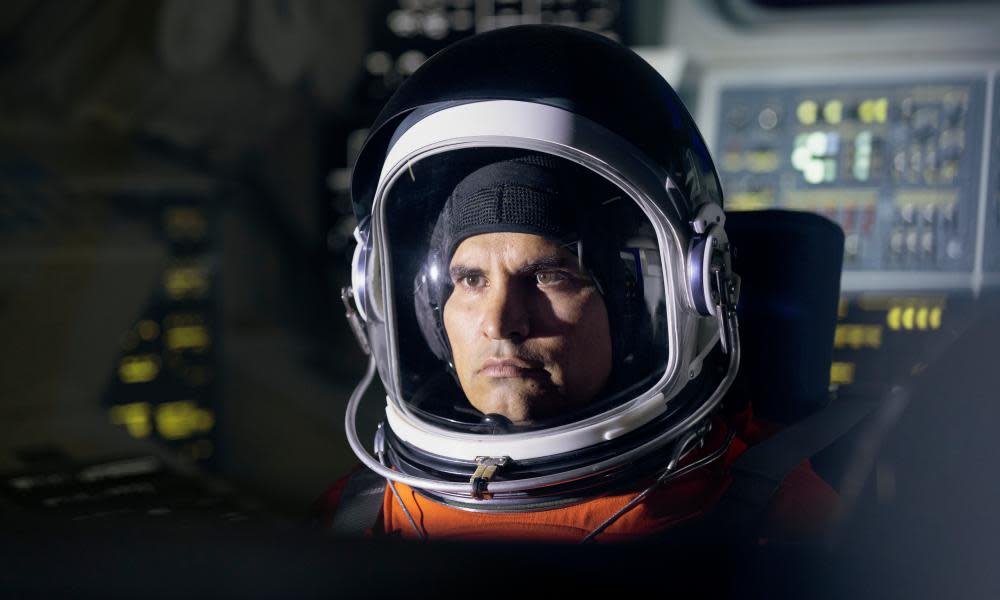A Million Miles Away review – charming space biopic tells an inspiring story

A young boy, the son of migrant farmers from Mexico, watches the Apollo 13 moon landing on a rickety living room TV set, riveted. The same young boy, now a young man, applies to Nasa’s astronaut selection program 11 times, year after year, without success. The young man, now middle-aged, finally makes it to the Kennedy Space Center, only to train several more years for even a shot at exiting Earth.
Related: Love at First Sight review – pleasurable enough Netflix rom-com
A Million Miles Away, the Amazon biopic of the astronaut José Hernández, has all the ingredients of an inspiring, sanded-down success story: Hernández, played capably by Michael Peña, went from itinerant student to barrier-breaking electrical engineer to the International Space Station, the first migrant farm worker to go to space. It hits the usual beats of space heroism – the ambition of a gravity-defying dream, the vaunted heroism of the space program, the sacrifices in the name of science and patriotism – with chapters delineated by “ingredients to success” in life, first outlined by his father, in line with Hernández’s later career as a motivational speaker.
All of this could be ho-hum and too sunny; it sometimes is. But in the hands of director Alejandra Márquez Abella, it is impossible not to be charmed by this tale of tenacity, commitment and community; it’s a real-life, straightforward encapsulation of the American Dream, entertainingly told and smartly trained on one Mexican American’s family’s experience over blunt moralizing.
Abella and fellow screenwriters Bettina Gilois and Hernán Jiménez, keep things moving at a brisk, chipper pace, starting with José’s peripatetic childhood helping his parents, Salvador (Julio César Cedillo) and Julia (Verónica Falcón), from Michoacán, on produce farms in California’s Central valley. In different hands, the scenes of José’s youth as a farm worker – 4.15am wake-up to the radio in the dark, cut and bruised hands, a quick succession of indistinguishable, cold American schools – could be played for pity or milked for trauma. But Abella frames these scenes through young José’s (an adorable Juan Pablo Monterrubio) curiosity and naivety. A roving camera brings us into the field, more playful than depressing; an opportunity for scolding turns into a motivational speech. (The film switches often between Spanish and English, particularly in the first third.) The hardship is a fact of life, as is the whirlwind of José’s memories and his youthful wonder at the stars.
One teacher, Miss Young (Michelle Krusiec) notices José’s penchant for mathematics, his hunger to learn, his dream to be an astronaut. A Million Miles Away plays this dream as both secret passion and unchangeable, somewhat mystical force; several characters, from his best friend and cousin Beto (Bobby Soto) to his wife Adela (Rose Salazar) to his eldest son Julio (Carlos S Sanchez) ask why José wants to go to space, and his answer is generally some version of: he just does. José thinks about space every hour of every day. “Who better than a migrant?” says Beto. “Somebody who knows what it’s like to dive into the unknown. Who better than that to dare leave this planet, man?”
The film seems aware of the representational politics its story holds by default, and engages with them more earnestly than pedantically. As the only Mexican American engineer at Livermore labs in the 1980s, José faces classic but still cutting discrimination – he’s relegated to a windowless office with broken lights, assigned menial copying tasks. The secretary assumes he’s the new janitor. He must do twice the work to get half the recognition, one instance of which is played to the song Whip It!
The scene is indicative of the film’s primary tone – a little lightheartedness to go with the serious mission. There’s a good heaping of personality amid the beat-by-beat timeline of a biopic, laundry and diaper talk with Adela along with ICBMs and anti-gravity training. A good portion of that credit goes to Salazar for keeping Adela, as the mother of five perennially putting her dream of a restaurant on the back burner to her husband’s ambition, a firm on-screen presence for what could be a recessive supportive role. “I refuse to be the oblivious, permanently annoyed whining wife,” she says to José. “So don’t put me there.”
The final third of the film, once José makes it to Nasa, takes on a bit of the feel of Nasa PR, from re-enactments of astronauts’ grueling training underwater and in planes to the iconography of the orange suits and final walk on Earth. (There’s a literal Wikipedia description of the Columbia space shuttle disaster in 2003, which took the lives of seven of Hernández’s colleagues, though that is really all that’s necessary to get the point across.) Depending on your feelings about the space program, it could seem overdone, more motivational speech than movie, though Peña’s lived-in performance, and a sustained focus on the community supporting him, helps the film’s climactic, heartstring-pulling triumph feel earned. It’s a story that exceeds the bounds of Earth with enough heart to keep it grounded.
A Million Miles Away is on Amazon Prime now

 Yahoo Movies
Yahoo Movies 
